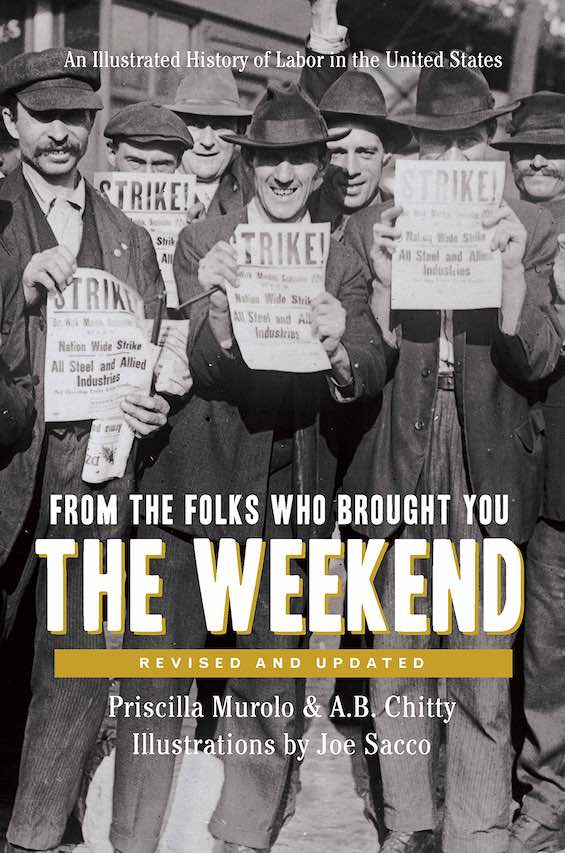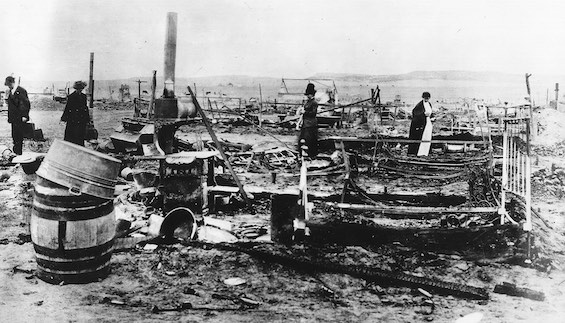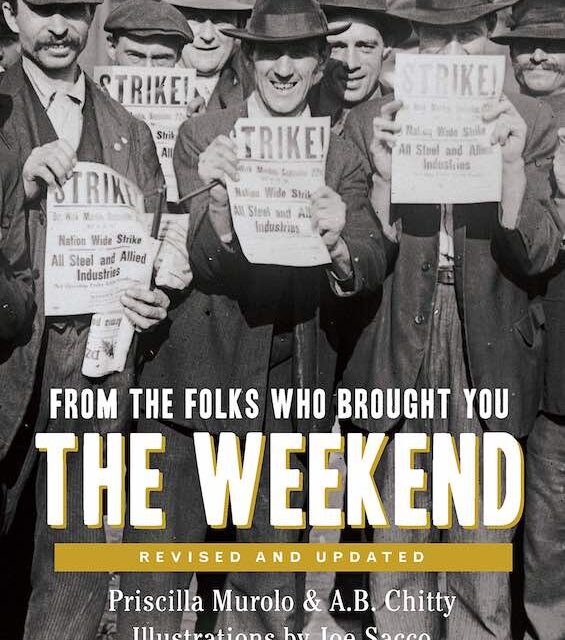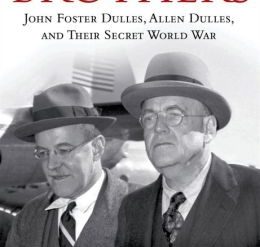
Most general American history texts give short shrift to the rise of organized labor. And when they do so, they tend to cite little more than a handful of large-scale clashes between labor and management in the late 19th and early 20th centuries. Familiar examples include the Haymarket affair (1886), the Homestead Steel Strike (1892), the Pullman Strike (1894), and the Ludlow Massacre (1914). A handful of other conflicts appear from time to time. But a more accurate and comprehensive approach begins in the colonial era. It encompasses the early years of the Industrial Revolution. The removal and extermination of Native Americans. The epochal struggle against slavery. And, only later, the emergence of Big Labor in the Depression and its decline beginning in the 1970s. Priscilla Murolo and A. B. Chitty include all that in their revisionist history of labor in America, From the Folks Who Brought You the Weekend.
A broad view of people at work
Murolo and Chitty construe the term labor to encompass work of all sorts, not just what happens in factories and offices. Slavery, both in homes and shops as well as fields. Native American hunting, fishing, and farming. Sharecropping under debt peonage. Women employed at piece-work in their homes or for their families. It’s a refreshing approach. And in telling this tale, the authors effectively convey a history of the United States consistent with Howard Zinn’s iconic A People’s History of the United States.
From the Folks Who Brought You the Weekend: An Illustrated History of Labor in the United States, Revised and Updated by Priscilla Murolo and A. B. Chitty (2018) 416 pages ★★★☆☆

This is not a book about the “labor movement”
In a foreword to the book’s first edition, the authors attempt to define their mission. “There are some interesting books we did not write,” they assert. “We did not write a comprehensive account of trade unions, their internal affairs, or their complicated relationships with one another in and out of federations. We did not write a history of work, nor a history of labor and capital. We did not write a history of labor politics.” Later, they add, “We write for the people who work too hard for too little, whose families and communities are hostage to the greed and arrogance of the same privilege that deforms our humanity and threatens our common welfare.” Thus, Murolo and Chitty make their perspective clear. But they fail to define clearly the boundaries of the tale they set out to tell.
A journalist might have told this story more readably
Often, when I read a book by an historian, I find myself wishing that a journalist had written it instead. Many historians cram their accounts of the past with a seemingly interminable recitation of facts. That’s certainly the case with From the Folks Who Brought You the Weekend. A journalist might instead cover the same ground by highlighting the experience of one or a handful of players in the drama—and drama results. By contrast, there may be no drama evident in the historian’s account. Unfortunately, Murolo and Chitty make that mistake. They’ve obviously done a stellar job of research, digging up one example after another for every point they make. But the story suffers as a result. It makes for slow reading.
About the authors

Priscilla Murolo
Priscilla Murolo retied in 2022 after 34 years on the faculty of Sarah Lawrence College specializing in labor history and women’s studies. She directed the college’s Graduate Program in Women’s History for 19 years. Murolo received her BA from Sarah Lawrence and an MA and PhD from Yale University. She is also the author of The Common Ground of Womanhood: Class, Gender, and Working Girls’ Clubs. She is married to her coauthor and has two sons, both of them graduates of Sarah Lawrence.
A. B. Chitty
Arthur B. Chitty is currently Assistant to the Chief Librarian for Special Projects in the Queens College Libraries of the City University of New York, where he has been employed since 1984. He is active in the teachers union and has been engaged in the antiwar veterans movement since he was discharged from the Navy in 1969, first in Vietnam Veterans Against the War and now in Veterans For Peace, and in the broader movement for peace and social justice. Chitty holds a B.A. in Mediaeval Studies & English Literature (Swarthmore College), a B.A. and M.A. in English Language (Oxford University), and a Master’s degree in Library Science. (University of North Carolina). He is married to Priscilla Murolo and has two stepsons and two grandchildren.
For more reading
I’ve also reviewed two other excellent books about the history of labor in America. Two are nonfiction, one a novel:
- The Edge of Anarchy: The Railroad Barons, the Gilded Age, and the Greatest Labor Uprising in America by Jack Kelly (The American labor movement in the Gilded Age)
- Rebel Cinderella: From Rags to Riches to Radical, the Epic Journey of Rose Pastor Stokes by Adam Hochschild (Early 20th-century America viewed through the life of one extraordinary woman)
- The Cold Millions by Jess Walter (A gripping tale about the early American labor movement)
You might also enjoy:
- Top 20 popular books for understanding American history
- 20 top nonfiction books about history
- Top 10 nonfiction books about politics
- In gaining a global perspective in an information glut, these books help
And you can always find my most popular reviews, and the most recent ones, plus a guide to this whole site, on the Home Page.


























